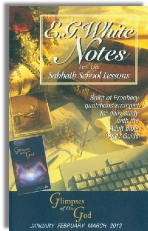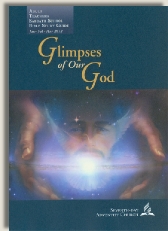|
||||||||||||||
Commentary on "The God of Grace and Judgment"
Day 3: Monday, January 23, 2012 - Judgment and Grace in Eden
Overview
The lesson is correct that both grace and judgment first appear in the account of the fall and God's response to the fall.
Observations
Grace is like Mom and Apple Pie. Everyone is in favor of it. But the real question is what does "grace" mean. Historically, there have been two main views of grace. I'll refer to these views as the Catholic and Protestant view; although the views extend long before Protestantism came on the scene and even before Catholicism was distinctly established. Clifford Goldstein summarized these differences well in an Adventist Review article from June 22, 2000. I will employ lengthy quotes from his article because so many SDAs would dismiss anything, no matter how well documented, that was written by a Former SDA.
"What is justification, and what does it mean for the justified? On this issue hangs, if not the law and the prophets, then certainly the gospel and the church. (For Martin Luther, justification by faith was the doctrine upon which the church stood or fell.) Since the Reformation, Lutherans along with almost all Protestants have insisted that justification by faith is an act by which God declares us righteous. Using such verses as 'Therefore we conclude that a man is justified by faith without the deeds of the law' (Rom. 3:28) and 'Therefore by the deeds of the law there shall no flesh be justified in his sight' (verse 20), the Reformers taught that justification was something that God does for us, not in us—a crucial distinction. By the Lord’s gracious act, we have the perfect righteousness of Jesus—the righteousness wrought by His sinless life and absolute obedience to God’s law—credited (or imputed) to us, as if that sinlessness and absolute obedience were now our own. Christ’s history, Christ’s obedience, Christ’s righteousness, become, legally, our history, our obedience, our righteousness, and these provide the only means by which we, as sinners, can be accepted by a holy and perfect God.
"However good the news, it gets even better: this legal declaration of righteousness comes—by faith alone. It can’t come to us by works, because we’re already sinners, and thus no matter how obedient and law-abiding, we can never achieve the perfect righteousness that a perfect God demands. Nothing that happens in us gives us merit that can, in any way, justify us in God’s sight. We’re justified only by what Christ did for us, apart from us, outside of us. 'For what saith the scripture? Abraham believed God, and it was counted unto him for righteousness. Now to him that worketh is the reward not reckoned of grace, but of debt' (Rom. 4:3, 4). God counted Abraham as righteous, not because of Abraham’s works, but because of Christ’s righteousness, which Abraham—through faith—had credited to him. Otherwise the reward would have been reckoned not through grace, but because Abraham earned it. If salvation were earned through works, it would be owed, and what’s owed is what we deserve—and how can any of us deserve Christ’s perfect righteousness? We can’t deserve what only Christ can give us, and that’s why our salvation has to be by grace alone through faith alone." (Adventist Review, June 22, 2000)
And concerning the Roman Catholic view he writes,
"In Roman Catholic teaching, justification isn’t just an act, an extrinsic declaration of righteousness, but also includes an ongoing process that is continually making a Christian righteous. Justification isn’t just a change in stature but a change in human nature itself. What Protestants understand as sanctification—the fruit, the personal subjective experience of justification— Roman Catholics subsume under the name of justification, which includes not just what God does for us but what He also does in us. This difference isn’t mere semantics; on the contrary, it gets to the heart of the most crucial teaching in all Scripture: How are we saved?
"According to the Catechism of the Catholic Church, “justification includes the remission of sins, sanctification, and the renewal of the inner man.” Justification, in Rome’s opinion, is what happens inside a person as well as outside. Christ’s merits, the merits that He wrought out in His perfect life by His perfect obedience to the law, are not just credited to a person but are actually infused into the life of the believer through the sacraments administered by the Roman Catholic Church itself. Rome teaches that this saving merit doesn’t remain outside of us but becomes something that happens inside a person, a change that gives that person merit before God….
"Rome denounced justification by faith alone: 'If anyone says that the sinner is justified by faith alone, meaning that nothing else is required to cooperate in order to obtain the grace of justification . . . let him be anathema'—a denunciation that, after more than 450 years, the church has never repudiated.
"Protestants understand 'the grace of justification' as purely a legal declaration; for Rome justification is a process of inner renewal, something that happens in us." (Adventist Review, June 22, 2000)
So which have you been taught about grace and salvation? Is grace purely a legal declaration? Or have you been taught that grace is the power that provides a change in our inner being, a change that allows us to live the same life that Jesus lived? As Mr. Goldstein rightly points out, the Protestant view is the Biblical view. But many times SDAism uses the word "grace" in the manner of Catholicism. Pay attention to how this seemingly simple little word is used.
Copyright 2012 BibleStudiesForAdventists.com. All rights reserved. Revised January 17, 2012. This website is published by Life Assurance Ministries, Glendale, Arizona, USA, the publisher of Proclamation! Magazine. Contact email: BibleStudiesForAdventists@gmail.com.
The Sabbath School Bible Study Guide and the corresponding E.G. White Notes are published by Pacific Press Publishing Association, which is owned and operated by the Seventh-day Adventist church. The current quarter's editions are pictured above.
Official Adventist Resources
Standard Edition Study Guide Week 4
Teacher's Edition Study Guide Week 4
Easy Reading Edition Study Guide Wk 4
Search the Complete Published Ellen G. White Writings
Please Support This Project


